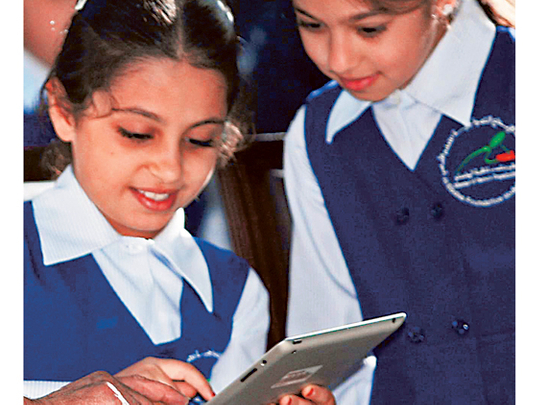
Abu Dhabi: Using technology as part of early education in classrooms helps students see that electronic gadgets can be used beyond the scope of entertainment, teachers in the capital said. It also enables them to form links between topics that they may not otherwise do, they added.
Since the younger generation is considered to be more tech-savvy than their older counterparts, it is imperative that children’s development in this area is not neglected or ignored.
“We have to catch up and get up to speed with them rather than ignore these important changes. Introducing useful technology in schools allows room for innovation as children learn how to come to their own conclusions and seek information on their own initiative. It enhances their sense of competition and their ability to work in teams,” said Abdul Rafiu Lawal, 34, a mathematics teacher at a public school in the capital.
Other educators claimed that the use of educational software has allowed their students to become more independent and only rely on their teachers for supervision and facilitation.
Evangeline Anamani told Gulf News that this new form of education is allowing young students to realise their potential in fields that may not necessarily be related to what they learn at school.
“After my students realised that they can make complex measurements with just a few steps on their school computers, many are now considering pursuing career paths in fashion design simply because they never previously knew how easy the use of technology makes otherwise arduous tasks,” the British teacher said.
“I think it’s our duty as educators to equip our students with as many skills as possible to face the world with when they are older,” she added.
However, without the appropriate organisation and management of classrooms, such efforts may become futile, experts warned.
“Some schools may not feel successful if they take on a project that incorporates technology in their daily routine. This may be because they are unable to get children to focus on what they are supposed to be working on or they might fail to see the value of their work. I think that managing the student-teacher ratio and reducing it can play a major role in producing positive outcomes,” Lawal said.
In fact, to solve this issue, some of the capital’s public schools have decided to grant students two teachers for certain subjects. This means that pupils are divided into two classrooms as the same subject is taught simultaneously by two teachers in different rooms.
The Abu Dhabi Technology Development Committee (TDC) had recently announced plans to launch the capital’s first Science Centre which will use state-of-the-art facilities to teach children fundamental concepts in physics, astronomy, and geology, among others. They have worked in collaboration with the Abu Dhabi Education Council (Adec) to create content that complements the existing science curricula in Adec schools.












